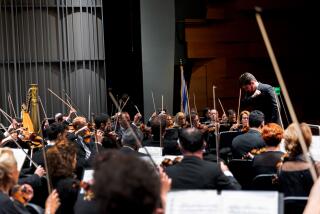ISRAELI ROCKERS GET COLLEGE OF THEIR OWN
- Share via
RAMAT HASHARON, Israel — Take four professional Israeli musicians recently returned from the United States and convinced you can learn as much about music from Bill Haley as you can from Ludwig van Beethoven. Add 67 young people dreaming of a musical career. Put them all in an abandoned school for children with learning disabilities, and what do you have?
The Rimon School of Jazz and Contemporary Music--more commonly referred to by its friends as the Israeli College of Rock ‘n’ Roll.
“It’s the only thing of its kind in the country,” said student David Shamir, a 24-year-old guitarist from New York, as he emerged from an ear-splitting jam session in the school’s bomb shelter.
“Our belief is that music is one language with many dialects,” commented Gili Dor, 33, a guitarist, composer and arranger who is one of the four co-founders of the college.
But until the Rimon School opened last fall, the academies where legitimate music students in Israel could continue their studies specialized in only one “dialect”--classical.
That’s one of the reasons all of the college’s founders have worked and studied in the United States. Three attended Boston’s Berklee College of Music and the fourth was graduated from Mannes College of Music in New York.
“Israel has a fantastic reputation for classical music,” said Yehuda Eder, another of the founders, “and the level of the academies of classical music is very good. But today most people create in the medium of rock ‘n’ roll and jazz.”
His goal and that of his colleagues, Eder said, is “to make a legitimate school for studying music through the medium of rock ‘n’ roll.”
While popular here, rock is not the potential ticket to mind-boggling wealth that it can be in the United States or Western Europe. Eder said his most popular record sold 20,000 copies, which he described as the equivalent of a gold album in America. Israel’s most popular album ever sold 120,000 copies.
“To be a rock-’n’-roller in Israel is not like in the United States,” Eder said. “You have to be an ideologist. We always joke that if you get to be a superstar, you can drive an autobianchi”--a small, cheap Italian car.
The man who is perhaps Israel’s biggest rock ‘n’ roll star “probably makes as much money as a successful insurance salesman in the United States,” added Zeev Chafets, a former Israeli government spokesman and rock music buff who grew up in Pontiac, Mich., and who helps Eder teach a performing workshop on ‘50s American rock.
Musicians here see their record albums primarily as promotion for their concerts. “It’s just the opposite of America,” said Guri Agman, a saxophonist and clarinetist and another of the Rimon School’s founders. On the other hand, added Agman, “socially, a musician (in Israel) is not looked upon so low like in the U.S.” Here, he claimed, they’re considered professionals--”doctor, lawyer, musician.”
While still awaiting official Ministry of Education accreditation, the Rimon School admitted its first students last October. The students paid the equivalent of $1,500 in tuition--slightly more than their peers at the prestigious Hebrew University--which testifies to the underlying interest. The college has 14 instructors on its faculty, most of them part time. Its facilities were donated by the city of Ramat Hasharon, which was looking for a tenant after declining attendance finally forced the school for the educationally disabled to close.
While their first love is contemporary music, the founders are all well-rounded, successful professionals intent on turning out graduates who will be the same.
All four studied classical music here, and co-founder Ilan Mochiach conducts the Israel Philharmonic and Jerusalem Symphony Orchestras. Dor composes jingles and sound tracks for video, television and radio.
The Rimon School curriculum includes composition, arranging and orchestration as well as performing. A course on the piano keyboard is mandatory.
More to Read
The biggest entertainment stories
Get our big stories about Hollywood, film, television, music, arts, culture and more right in your inbox as soon as they publish.
You may occasionally receive promotional content from the Los Angeles Times.










